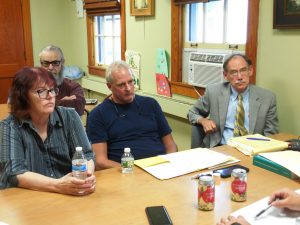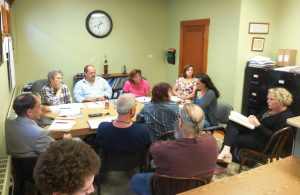HUNTINGTON – Prior to meeting with Comcast representative Eileen Leahy on Wednesday, Huntington Town Counsel William Hewig, III of KP Law brought the Board of Selectmen up to date on the negotiations with the cable company which have been ongoing since 2014. Also present at the meeting were members of the town’s Cable Advisory Board (CAB).

Huntington Cable Advisory Board (L-R) Johanna Brackney, Robert Brackney, Chris Saner) and Town Counsel William Hewig, III. (Photo by Amy Porter)
Hewig said that the process for cable renewal licenses can take up to three years, and licenses can be for anywhere from three to ten years. Hewig said they have been trying to determine Huntington’s future cable needs; adding that the negotiations have been difficult.
Currently the town is in the ascertainment process, which included a public hearing in November of 2015 and multiple meetings. The number one concern has been connection to broadband for all residents. The second was to get an access cable channel up and running in the town.
What has complicated the negotiations somewhat is the Massachusetts Broadband Institute’s (MBI) agreement with Comcast for last mile connectivity at a minimum of 96% for partially served towns. The agreement, signed last August, will provide state funds to reimburse partial project costs for Comcast to construct broadband internet access to additional homes and businesses. The town of Chester is also included in the agreement.
Currently, approximately 96 homes in Huntington do not have cable access. In a final reconciliation with Comcast and MBI of homes to be served, 17 homes were not on the list. The town had asked Comcast to pay for 50% of the homes not cabled (8 ½ homes), and include it in the license, which was rejected.
Chris Saner, chair of the Cable Advisory Committee, said his committee has been adamant since day one that the contract happens only if there is 100% cable access. He also said he does not want to sign a contract that doesn’t offer any protection to ensure the homes that are on the list are cabled.
“As one of those (79) people, I don’t want to leave that to chance. It’s not fair to any of those residents to leave them unprotected,” Saner said.
Hewig said that it is very unusual for a license to say every home will be cabled. “I have never seen a license of 100% cabled,” he said. Hewig said he tried to get Comcast to put in the license that they were obligated to cable the homes on the list, but they refused. He suggested instead a side agreement, which was also refused.
Hewig said there is protection, in that the town would be able to sue Comcast if they breach the MBI franchise agreement, or to sue MBI if they don’t fulfill their agreement, which requires completion of the work by August of 2018. He said the funding has been approved, and make ready work including pole surveys has begun.
Hewig also said the town cannot operate without a license, and risks having the FCC shut down the cable in the town if there is an impasse. Unless they negotiate in good faith, there are severe consequences, Hewig said.
Hewig said Comcast has offered a graduated franchise fee to the town over the ten years of the contract, beginning with 2% of gross annual percentages in the first three years; 3% over the next four years, and 3.5% the last three years, for a total projected contribution of $194,000. Hewig said Comcast’s position is that the amount of the franchise fee would allow the town to do the buildout for the remaining homes. The previous ten year contract with Comcast included a $3,000 franchise fee over ten years.
The franchise fee would be added to customers’ bills. Hewig explained that for an average bill’s cable television portion of $70, the increase during the first three years at 2% would be $1.40, the next four years at 3% would be a $2.10 increase, and the last three years at 3.5%, a $2.45 increase.
Huntington selectman Darlene McVeigh commented that technology is changing, and more and more people are turning off cable television and using alternate technology to stream television. Hewig agreed, acknowledging that the franchise fee only applies to cable television.

Comcast license negotiations continued on Wednesday with Comcast representative Eileen Leahy (far right). (Photo by Amy Porter)
Leahy was then invited in to join the meeting, and Hewig began by thanking her for agreeing to join them. He then proceeded to go over the new agreement that Comcast had proposed.
“Honestly, we’re a little disappointed in this offer; being left out of any buildout outside of what MBI is doing. We’re really disappointed in that,” said Select Board chair Ed Renauld. He added that over the past 18 months, the town had made it clear that buildout was the priority, and should be included in the license agreement.
“I understand that buildout is important,” Leahy said. She said that Comcast’s grant partnership with MBI will bring everybody to 96% connectivity, adding that Huntington has one of the bigger buildouts at 77 homes, out of the nine partially served communities in the program with MBI.
Leahy also said the cost to build out to the 17 homes not included on the list would be $139,000, which would be covered by the graduated increase the company has offered to the town through the franchise fee. She said it also gives the town another $60,000 for a PEG cable access station, which has been black for a number of years.
“Those 17 homes – we’re getting you there,” Leahy said.
“I don’t understand how 17 homes can’t be built out by Comcast’s profits,” said CAB member Johanna Brackney. Saner added that previous contracts signed with the company all had line extensions in them paid for by Comcast. Leahy said those were contracts negotiated before the agreement with MBI.
“Every time you come up with a number, I’ve exceeded that number,” Leahy added. She also said there is protection in the contract between the state and Comcast, addressing another of Saner’s concerns. “We’ve met all of our deadlines with the state, and exceeded them in some instances,” Leahy said.
Renauld then asked Leahy if she would mind waiting for ten minutes while they discussed the offer.
Hewig said the town has two options: To accept the offer of $195,000 over ten years, or to give Leahy a counter offer.
McVeigh asked what would be the risk of extending the current contract for three years, which was another option discussed earlier in the meeting. Hewig said the risk would be getting nothing for it, but the advantage would be to see what happens by the fall of 2018.
Renauld said he would invite Leahy back in and tell her that the board would put it on the agenda for the next meeting, to allow the three selectmen to talk about it. “I trust that they’re going to do the buildout,” Renauld said, adding that he would be satisfied with a license that would enable the town to build out to the remaining 17 homes.
When Leahy returned, Renauld informed her that the selectmen would reach a decision at a special meeting scheduled for August 2, after which they would consult with the Cable Advisory Board and get back to her.

